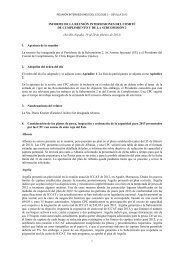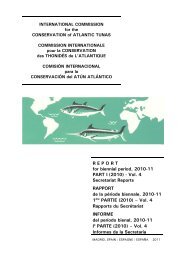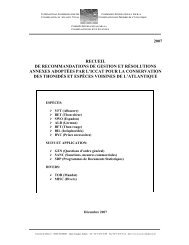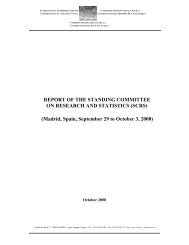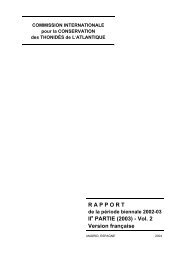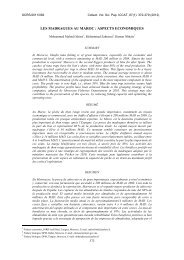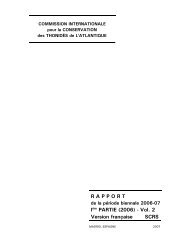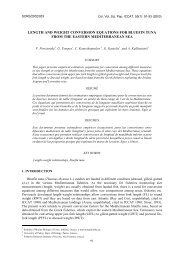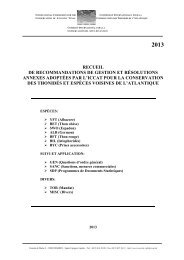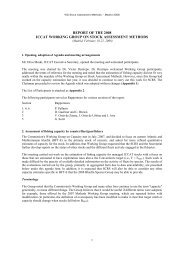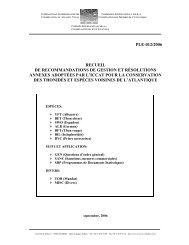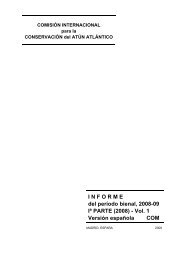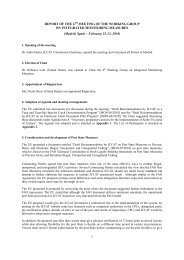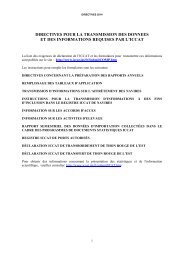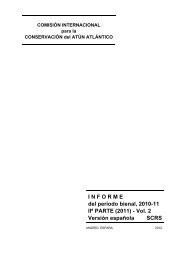E - Iccat
E - Iccat
E - Iccat
You also want an ePaper? Increase the reach of your titles
YUMPU automatically turns print PDFs into web optimized ePapers that Google loves.
COMPLIANCE COMMITTEE<br />
and EU rules pertaining to the use of driftnets. Measures implemented and the results of the verifications carried<br />
out in 2012 confirm that illegal driftnet l activities are no longer occurring. Morocco also stated that its extensive<br />
program to ban driftnets has been successfully implemented and driftnets activities have been eradicated.<br />
Morocco emphasized the economic and social cost of this effort and called upon all delegations to continue with<br />
necessary measures to prevent the return of illegal activities.<br />
Several cases of transshipments at sea of ICCAT tuna and tuna like species caught by pelagic trawlers targeting<br />
small pelagic species were discussed. It was noted that the carrier vessels receiving the fish were not registered<br />
in the ICCAT record of authorized vessels. A discussion followed regarding the interpretation of<br />
Recommendation 06-11 on whether the flag CPC of the reefer or the flag CPC of the catching vessels has the<br />
obligation to submit the list of reefers to ICCAT. Belize announced that it will include all its reefers within the<br />
ICCAT record of vessels authorized to receive transshipments to avoid further problems. The Chair referred this<br />
issue to the PWG, to be discussed under the new proposal for a Recommendation by ICCAT on transshipment.<br />
The EU supported a discussion at the 2013 meeting of the Working Group on Integrated Monitoring Measures<br />
(IMM) on how to consider by-catches of ICCAT species taken in lawful fisheries that do not target such species.<br />
It was noted that, based on port inspections of carrier vessels, these catches were not insignificant amounts and it<br />
is necessary to determine how such catches should be reported to ICCAT, and to what extent they are allowed to<br />
enter into trade. The Chair referred this issue to the PWG, to be considered as a point on the Agenda of an IMM<br />
meeting in 2013.<br />
Ghana was commended for their improvements in monitoring and control activities, in particular with regards to<br />
the establishment of an operational VMS system, the provisions included in their fishing license prohibiting their<br />
fishing vessels to undertake transshipments at sea, and the traceability system implemented by canneries. As<br />
well, Ghana confirmed that the group of Ghana-flagged vessels owned by Korean nationals that was the center<br />
of illegal activities in the past is presently monitored by VMS. Korea informed the Committee that their<br />
nationals have been informed of ICCAT concerns and had requested them to refrain from undertaking in the<br />
future illegal practices as the ones carried out in the past.<br />
Korea stated that under its current national legislation it is difficult to enforce ICCAT conservation and<br />
management measures on their nationals operating vessels under another nation’s flag. In this regard, Korea<br />
intends to review its national legislation.<br />
6. Actions required in relation to issues of non-compliance by CPCs arising from Items 4 and 5<br />
The Chair reviewed the revised version of the draft “Compliance Summary Tables” which included the<br />
responses given by each CPC to the allegations of potential infractions, as well as the recommendations of the<br />
Chair, in consultation with the Review group, for appropriate actions that the Committee should take vis-à-vis<br />
such infractions.<br />
Based on the discussions which took place during the Committee and in particular, in light of the provisions of<br />
ICCAT’s Recommendation on Trade Restrictive Measures [Rec. 06-13], the Committee agreed on the following:<br />
− No action necessary with regard to 16 CPCs<br />
− Maintain the identification of 5 CPCs<br />
− New identifications were issued to 2 CPCs<br />
− Lift the identification to 4 CPCs, which will receive a "letter of concern"<br />
− In total, 25 CPCs to receive a "letter of concern"<br />
The Compliance Committee noted that all identified CPCs must respond to the issues raised in their letter at least<br />
30 days before 2013 ICCAT annual meeting and agreed that all other CPCs receiving a letter of concern should<br />
also respond prior to that meeting.<br />
The Committee also expressed its concern on the implementation of the BCD system by China. However, China<br />
reiterated that the problem was that the ICCAT Convention and rules do not apply to Hong Kong, which has a<br />
special administrative status vis-à-vis China. Therefore, despite its efforts it was difficult for China to fully<br />
enforce the BCD system in this territory. The Chair noted that some concerns had been raised about<br />
implementation of the BCD system in other administrative areas and encouraged China to continue its efforts to<br />
monitor and report on bluefin tuna imports.<br />
271



